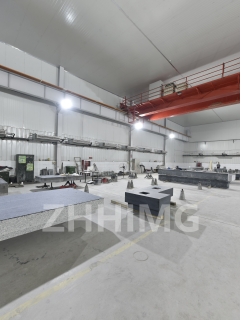Granite is a commonly used material in the manufacture of measuring instruments due to its durability and stability. However, the weight of granite can significantly affect the performance of these instruments.
The weight of granite plays a vital role in the stability and accuracy of measuring instruments. When measuring instruments are made with granite bases, the weight of the granite provides a stable base, preventing any movement or vibration that might affect the accuracy of the measurement. The heavier the granite, the more stable the instrument, resulting in more accurate and reliable results.
Additionally, the weight of granite can also affect the overall performance of the measuring instrument in terms of its resistance to external factors such as temperature changes and environmental conditions. Heavier granite has better thermal stability, meaning it is less likely to expand or contract due to temperature changes, ensuring consistent measurements regardless of the surrounding environment.
Additionally, the weight of granite affects the overall durability and lifespan of your measuring instrument. Heavier granite has better wear resistance, ensuring the instrument maintains its accuracy and performance over time.
It is important to note that while the weight of the granite is critical to the performance of the measuring instrument, it is also crucial to consider the balance between weight and practicality. The extremely heavy weight of granite may make the instrument difficult to transport or handle, which may limit its usability in certain applications.
In summary, the weight of granite has a significant impact on the performance of measuring instruments. Its stability, accuracy and durability make it the ideal material for ensuring precise and reliable measurements. However, a balance must be found between weight and practicality to ensure that the instrument is both effective and convenient to use in a variety of environments.
Post time: May-13-2024

